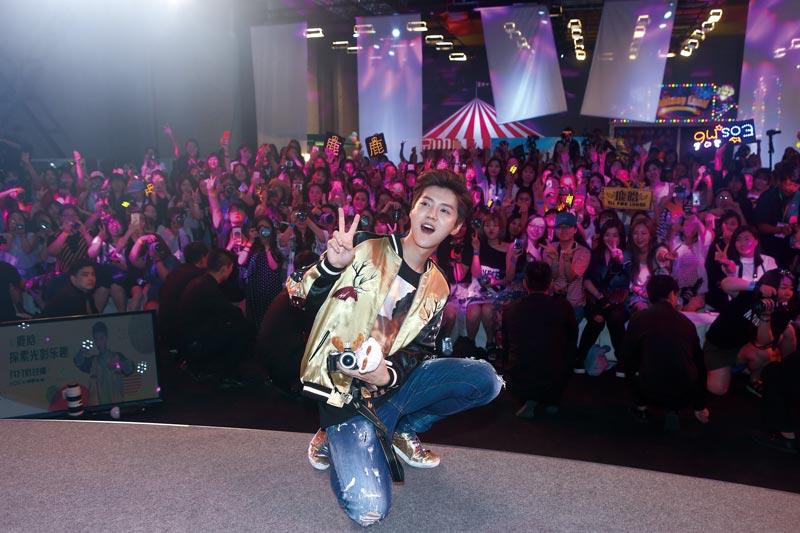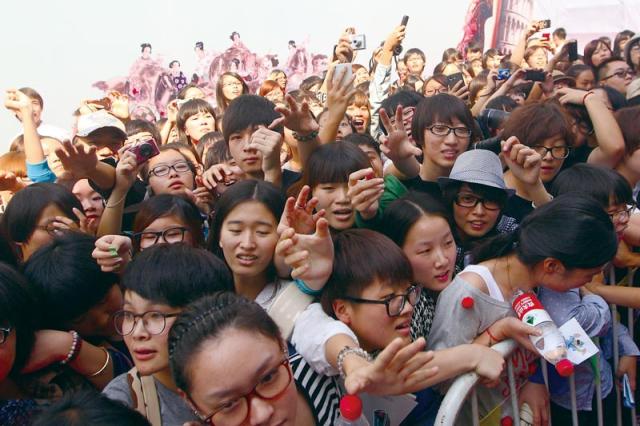For any Internet user who lives in China, it’s impossible to ignore that a huge wave of superfan love has reshaped the country’s pop culture. It often centers on young male idols – known as “young fresh meat” in Chinese.
“Lufans,” fans of the 27-year-old singer and actor Lu Han, a former member of South Korean boy band EXO, are extremely prominent among the superfan set.
They display extraordinary commitment and unity at concerts, wearing identical yellow-colored clothing and donning antlers, a symbol of the star (whose surname, Lu, means deer in Chinese). During one tour in March 2016, 1,731 Lufans wore antler headbands simultaneously, netting Lu Han a Guinness World Record for the largest gathering of people wearing antlers.
They had earlier obtained a record for the most commented on Weibo post, after a Lu Han post gained over 100 million comments in September 2015 (according to Guinness World Records, the nearest challenger had less than 30 million). Lu Han’s recent post announcing his relationship with actor Guan Xiaotong on October 8 got more than 5.65 million likes and attracted 2.83 million comments. The post caused a huge spike in traffic that was said to have temporarily crashed social media app Sina Weibo.
In the era of social media, fans have gone far beyond attending concerts, buying CDs and plastering posters on their bedroom walls. They have become organizers, promoters and news producers, performing jaw-dropping activities on and offline to draw the media and the public toward their beloved stars.
It’s an understatement to call Lu Han “popular.” The star has 41.8 million followers on Sina Weibo alone. That’s more fans than there are Canadians. He has more than 100 online fan clubs based in 28 nations – the biggest being Lu Han Bar, with 3.25 million registered members.
Lucy Yang, a 21-year-old journalism student at Shanghai International Studies University, says she has been a “Lufan” for over a year.
She doesn’t hide her affection when talking about the beloved star: “He [Lu Han] has a heart of gold, so clear and so pure. He always keeps a sense of curiosity toward the world like a child. And his laugh… the way he laughs out loud is so expressive that every time I see it, I laugh like an idiot as well.”
Yang has participated in a number of charity events launched by various Lu Han fan clubs, including donating to the Love Lunch Project to help disadvantaged children, and using crowdfunding to purchase books for rural children. “Lu Han always encourages us to help more people in need. So instead of sending gifts, Lufans prefer to do charity,” Yang told NewsChina.
Lu Han’s stellar popularity is evidenced by the enormous power of his fan base, which the press has described as “Lu Han’s Fan Empire.” They resemble a well-disciplined, easily mobilized legion.
To celebrate Lu Han’s birthday in April 2015, Lufans accomplished three feats: they completed a love relay spanning five continents and including fans from more than 70 countries; they posted more than 42 million comments on a single Weibo post; and more than 20,000 Lufans from 67 cities in seven countries participated in dozens of charity projects. The “Yellow Wristband Movement” alone raised 76,000 yuan (US$11,200) to help 10,000 elderly sufferers of Alzheimer’s disease.
Lufans around the globe help translate videos about Lu Han’s latest news, films, dramas and reality shows into English, Korean, Japanese, Arabic, Vietnamese, Indonesian, French, Turkish, Persian and more. His videos, photos, and news about him are added to YouTube, Twitter and Instagram as soon as they are released.
Baraa, 23, is an Iraqi Lufan who translates Lu Han’s videos into Arabic and posts them on YouTube. She graduated from the University of Babylon this year, majoring in computer science.
“I can tell you he has a very great number of fans in the Middle East,” Baraa told NewsChina. Her admiration for Lu Han has helped her befriend like-minded people around the world, including in China, the United Arab Emirates, Saudi Arabia, Qatar, Iran, Turkey and Australia.
Baraa has been a Lufan for four years. For her, the star’s kindness is more important than his good looks and music. “The environment I live in is so hopeless,” said Baraa, “People around me never encourage me, even my family. So I must make my environment better to be able to survive. In order to do that I must work harder, but this has been very difficult since I’m doing it alone. Lu Han and his positive energy have helped me become a very different person from who I was,” Baraa told our reporter.
“I first heard of Lu Han in my first year of college. At the time, I was wondering why I needed to keep studying, knowing that I wouldn’t be able to find a job after graduation. Why did I still live in this country full of war? Why wasn’t I happy? After I discovered him and heard his words, that ‘we must depend on ourselves to be a better person,’ I just thought ‘hey Baraa, just do what you have to do. Make your future by yourself.’ I worked my hardest to get high marks and started to learn Chinese. I became an expert in translation even before I graduated. I’ve started on the way to a better life.”
As a Lufan, an unforgettable moment for Baraa was the day two years ago when her idol replied one of her posts and reposted it. Lu Han wrote the following encouraging message: “No matter what environment you are living in, do not forget happiness and hope in your life. Thank you! Cheers!” He later launched an event on Weibo especially for her, appealing to more people to spread positive messages.
“I’ve never met him or been to one of his shows. But his words are written in my heart wherever I go,” Baraa said.
Cultural analysts have said Asia’s intense fan culture has radiated out from Japan and South Korea. The rise of the Chinese entertainment industry has seen it snowball in China, a country with an estimated 730 million Internet users.
Before the early 2000s, the industry was dominated by Hong Kong, Taiwan, Japan and South Korea. But in recent years, entertainment companies in the Chinese mainland have already got the hang of producing successful idols for the vast mainland market.
Fans refer to their activities as “yingyuan,” a word drawn from the Japanese “oen,” which has been used by Japanese and South Korean pop culture fans to describe activities intended to support their own idols.
Many fans believe the extent of their devotion will have a direct impact on their idols’ position and development in an exceptionally competitive entertainment industry. Following the maxim “I love [my idols], so I feel responsible for spreading the word,” different fan groups compete for public attention to build their idols’ influence.
Fans of the TFBoys, a Chinese boy band, are as formidable as the Lufans. Consisting of three teenagers, Karry Wang, Roy Wang and Jackson Yi, TFBoys is one of China’s most popular groups.
Last year, millions of fans joined a global campaign to celebrate Karry Wang’s 17th birthday. Ads funded by fans sending birthday wishes to Wang appeared at New York’s Times Square, Beijing’s Water Cube, and other public squares in major cities, including Taipei, Tokyo, Paris, Seoul, and Reykjavík. What’s more, a full page of Morgunblaðið, a newspaper in Iceland, was filled with birthday ads – fans took the initiative because Wang once said he wanted to travel to the country.
“We were truly amazed,” said Maria Liljagaga, who works in Morgunblaðið’s advertising division. She told Vista magazine she had never met clients like these before. “The whole thing was like performance art,” she said.
In November 2017, fans participated in 88 events to celebrate Roy Wang’s 17th birthday, spending roughly three million yuan (US$450,000) to paint a domestic CRJ-900 aircraft in the teen star’s likeness. The plane will enter service in the next three months. They also crowdfunded a telecommunications tower, christened the “Roy Signal Tower,” erected in a small village near Beijing because the teen star reportedly once said rural education could not be improved without Internet access.
But some cannot see the point of such slavish devotion, and refer to these ardent young people online disparagingly as naocanfen, or “brain-damaged fans.” However, statistics show the majority of such fans are highly educated young women with strong purchasing power.
According to the “2016 Big Data Report on Chinese Fans,” issued by search engine company Sougou and music video sharing site YinYueTai, around half of this group is aged 20 to 29, with those aged 30 to 39 making up 22 percent. Most of them are well-educated, and 53 percent have a university undergraduate degree or above. Thirty-seven percent spend more than 500 yuan (US$75) each month on the passion, with nearly three percent spending 5,000 yuan (US$750) or more.
The passionate idolatry of fans would not have been able to create yingyuan culture were it not for the fans’ digital literacy.
“Before the era of social media, fans did not have a two-way communication channel to interact with celebrities like today’s fans do. They wrote letters to idols they loved and held small-scale events. But advances in communication have given fans more access to the process of producing, spreading, and sharing information related to their favorite idols,” Yan Pu, a researcher at the Oxford Internet Institute of the University of Oxford, told NewsChina.
“The public can see not only how fan communities operate and organize themselves, but also the interesting way they communicate with each other. Fandom has transformed from an exclusive subculture into a much more influential one with high visibility,” Yan said.
For Yang Ling, assistant Professor at the Department of Chinese, Xiamen University, the Internet’s role in building movements is a key part of the picture. “Individuals have been brought together into a community,” said Yang, a pop culture expert who has studied fandom culture for more than a decade and a half. “What we see is the power of a collective, stronger than that of any individual. Their actions can easily cause a sensation.”
Yang said young people gain a sense of identity, belonging and positive energy from idol worship. “Idols can have many extraordinary qualities, be it good looks, a special talent or exceptionally amiable personalities. Fans’ adoration for stars reflects their own longing for beauty, perfection and happiness,” Yang said.
Individuals need an “other” in order to gain self-knowledge, Yang said, and popstars can be just that. They’re highly visible and offer teens a path to self-recognition and self-understanding.
An interesting phenomenon in the history of Chinese fandom is that, compared with today’s fans, those of the late 1980s to the early 2000s preferred stars that displayed strong youthful rebellion, such as the rock star Cui Jian, the rapper and R&B singer Jay Chow and the singer Chris Lee (Li Yuchun), whose success can be in part attributed to their rebellious characteristics. Today’s idols, from Lu Han to the TFBoys, draw fans with their delicate faces, sweet temperaments, and kindness, rather than through non-conformity.
“What was deemed rebellious in the past now seems not that rebellious at all,” said Yang, who identified a ubiquitous fatigue among young Chinese people that had turned them onto sweet, gentle idols with positive messages.
“A sense of fatigue pervades every inch of our society,” she said. “Stresses come from everywhere: the unsteady global economy after the 2008 financial crisis, skyrocketing housing prices, the unsatisfying social security system, and most importantly of all, the pressures of survival and development.”
As she indicated, young people hope to be special, but also strive to meet social expectations. All of this creates fatigue. “Lu Han’s fans describe him as a cute little animal that wouldn’t hurt a fly. Interacting with an idol like that will give fans a sense of warmth and ease,” Yang said.
“The young generation today have gradually lost hope they can make a difference in the public sphere, or achieve social mobility. Idol worship, for them, is a way to create a private haven for their souls.”
Qi Yue, a 27-year-old physician and Lufan told NewsChina: “In the past, we admired Leslie Chang and Stephen Chow because they were extraordinarily gifted, rebellious geniuses. We hoped to be like them, hoped that we could change the world as rebels. But things have changed. Changing the world seems to become an extravagant wish. Now we care more about stopping the world from changing us. Just like Lu Han – he might not have extraordinary talent, but he will always be himself – the simple, genuine, unaltered youth.”

 Old Version
Old Version




